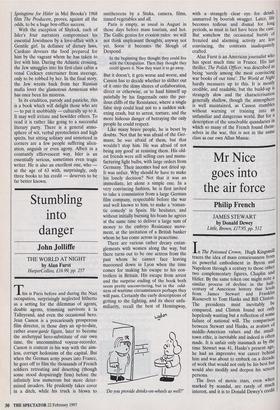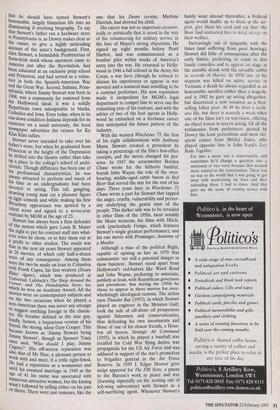Mr Nice goes into the air force
Philip French
JAMES STEWART In The Poisoned Crown, Hugh Kingsmill traces the idea of mass consciousness from its powerful embodiment in Byron and Napoleon through a century to those other two complementary figures, Chaplin and Hitler. By the same token one might note a similar process of decline in the half- century of American history that leads from James Stewart and Franklin Roosevelt to Tom Hanks and Bill Clinton. The presidents must inevitably be compared, and Clinton found not only hopelessly wanting but a reflection of some failure of national will. The comparison between Stewart and Hanks, as avatars of middle-American values and the small- town ethic, is inevitable and indeed is often made. It is unfair only inasmuch as by the time Stewart was 41, Hanks's present age, he had an impressive war career behind him and was about to embark on a decade of work that would not only be his best but would also modify and deepen his screen persona.
The lives of movie stars, even when marked by scandal, are rarely of much interest, and it is to Donald Dewey's credit that he should have turned Stewart's honourable, largely blameless life into an illuminating if overlong biography. To say that Stewart's father ran a hardware store in Pennsylvania is, as Dewey makes clear at the outset, to give a highly misleading account of the actor's background. First, Alex Stewart, a formidable Presbyterian of Scots-Irish stock whose ancestors came to America just after the Revolution, had been educated at an exclusive prep school and Princeton, and had served as a volun- teer in both the Spanish-American War and the Great War. Second, Indiana, Penn- sylvania, where Jimmy Stewart was born in 1908, was a community far removed from the Hollywood ideal; it was a solidly Republican town inhosOtable to blacks, Catholics and Jews. Even today, when in its run-down condition Indiana depends for its existence on a small university, the local newspaper advertises the venues for Ku Klux Klan rallies. Stewart never intended to take over his father's store, but when he graduated from Princeton at the height of the Depression he drifted into the theatre rather than take Up a place in the college's school of archi- tecture. Though diffidence has been one of his professional characteristics, he was always attracted to perform and much of his time as an undergraduate had been devoted to acting. This tall, gangling, d. rawling young man cut a pleasant figure in light comedy and while making his first Broadway appearance was spotted by a talent scout and signed to a seven-year contract by MGM at the age of 23. Stewart has always been a firm defender of the system which gave Louis B. Mayer the right to put his contract staff into what- ever roles he chose, or to hire them out at a profit to other studios. The result was that in the next six years Stewart appeared In 28 movies, of which only half-a-dozen were of any consequence. Among them were the two he made on loan to Columbia with Frank Capra, his first western (Destry Rides Again), which was produced at Universal, Lubitsch's The Shop Around the Corner, and The Philadelphia Story, for Which he won an Academy Award. All the movies were on contemporary subjects and on the two occasions when he played a non-American there was never any attempt t° suggest anything foreign in the charac- ter. He became defined as the nice guy, kindly, honest, a loquacious version of his friend, the strong, silent Gary Cooper. This became known as `Jimmy Stewart being Jimmy Stewart', though as Spencer Tracy once said, 'Who should I play, Jimmy Cagney?' His off-screen reputation was also that of Mr Nice, a pleasant person to work with and meet, if a trifle tight-fisted. He had a reputation as a womaniser and until his eventual marriage in 1949 at the age of 41 his name was associated with numerous attractive women, but the kissing wasn't followed by telling either on his part or theirs. There were just rumours, like the one that his Destry co-star, Marlene Dietrich, had aborted his child.
His career was not so important econom- ically or artistically that it stood in the way of his volunteering for military service in the face of Mayer's strong objections. He signed up eight months before Pearl Harbor, and was commissioned as a bomber pilot within weeks of America's entry into the war. He returned to Holly- wood in 1946 a full colonel in the Army Air Corps, a war hero (though he refused to discuss his experiences or appear in war movies) and a matured man unwilling to be a contract performer. His new reputation made it inexpedient for MGM's legal department to compel him to serve out the remaining year of his contract, and with the advice of two of the best agents in Holly- wood he embarked on a freelance career that anticipated the future pattern of the industry. With the western Winchester 73, the first of his eight collaborations with Anthony Mann, Stewart created a precedent by taking a percentage of the film's box-office receipts, and the movie changed his per- sona. In 1947 the screenwriter Borden Chase wrote for the hitherto bashful, boyish John Wayne the role of the over- bearing, middle-aged cattle baron in Red River that served the star for the rest of his days. Three years later in Winchester 73 Chase wrote a part for Stewart that tapped the anger, cruelty, vulnerability and perver- sity underlying the genial man of the people. This darker side was to be revealed in other films of the 1950s, most notably the Mann westerns, his films with Hitch- cock (particularly Vertigo, which features Stewart's single greatest performance), and his one movie with Preminger, Anatomy of a Murder.
Although a man of the political Right, capable of opining as late as 1970 that communists 'are still a potential danger in show business', Stewart stood apart from Hollywood's red-baiters like Ward Bond and John Wayne, preferring to associate, publicly at least, with Republican governors
and presidents. But during the 1950s he
chose to appear in three movies for over- whelmingly ideological reasons. The action yarn Thunder Bay (1953), in which Stewart played an engineer in the Mexican Gulf, took the side of off-shore oil prospectors against fishermen and conservationists, thus defending his own investments and those of one of his closest friends, a Hous- ton oil tycoon. Strategic Air Command (1955), in which he played a baseball star recalled for Cold War flying duties, was propaganda for the US Air Force and was adduced in support of the star's promotion to brigadier general in the Air Force Reserve. In 1959 J. Edgar Hoover gave script approval for The FBI Story, a paean to the Bureau's work in peace and war (focusing especially on the rooting out of left-wing subversives) with Stewart as a self-sacrificing agent. Whenever Stewart's family went abroad thereafter, a Federal agent would shuffle up to them at the air- port, give them his card and say that 'the Boss' had instructed him to keep an eye on their welfare.
Increasingly out of sympathy with the times (and suffering from poor hearing), Stewart did little of consequence after the early Sixties, preferring to coast in dim family comedies and to appear on stage as the amiable drunk with the invisible rabbit in revivals of Harvey. In 1970 one of his stepsons was killed on active service in Vietnam, a death he always regarded as an honourable sacrifice rather than a tragedy, and in 1982 he gave up acting altogether, but discovered a new vocation as a best- selling folksy poet. At 89 he lives a icelu- sive life, but there is scarcely a week whLii one of his films isn't on television, offering an object lesson in screen acting. Of all the testimonies from performers quoted by Dewey the least pretentious and most elo- quent comes from Shirley Jones, who played opposite him in Juhn Ford's Two Rode Together: For him a scene was a conversation, and sometimes he'd change a question into a statement or vice versa because that seemed more natural to the conversation. There was no way in the world that I was going to get away with memorising my lines and then unloading them. I had to listen. And that gave me the sense of creating scenes with him.



























































 Previous page
Previous page